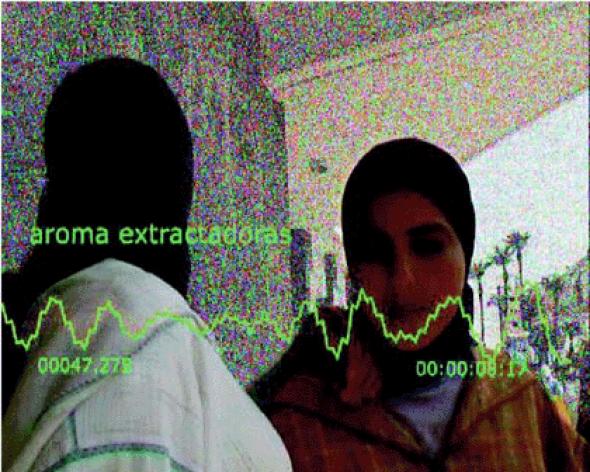Policy of Truth: Critical Art in Corporate Institutions
The Generali Foundation, an entirely corporate-funded museum in Vienna, has acquired an enviable reputation for staging ambitious, culturally critical exhibitions. Paying homage to the conceptual art and institutional critique of the 1960s, ’70s, and ’80s, its curatorial policy has established important threads of historical continuity across several generations of artists whose importance was overlooked during much of the 1990s. At a time when the art market had relegated the politics of representation to the back burner, one-person exhibitions on Adrian Piper, Martha Rosler, and Andrea Fraser made Generali an important and proactive site for the production of feminist cultural discourse.
The recent Generali exhibition, Geography and the Politics of Mobility, was a timely advance on these individual retrospectives. This show, curated by video artist Ursula Biemann, brought together a group of contemporary artists exploring state-corporate power, globalised labour relations, and migration. Its tacit object of critique was the capitalist system and the types of political relations it brings into being.
This might seem surprising for a cultural institution whose sole patron is one of the largest insurance companies in the world. Equally, participating in the show could pose complex political problems for the corporate-critical artists working under its aegis. Brian Holmes is an affiliate of exhibitors Bureau d’Ètudes (see Mute 24), a contributor to the exhibition catalogue, and – in an article in Springerin magazine – one of the few to publicly take the show’s bull of an issue by the horns. Mute asked him to discuss his rationale for taking part, and to elaborate on his statement that a policy of straight-talking is the only genuinely disruptive move
The mapping of contemporary capitalism, undertaken in different ways by thousands of involved intellectuals over the last decade, has made certain realities clear. That the basis of life insurance is death, for one thing. Corporate funds investing the savings of the comfort classes are major players in the worldwide game of financial speculation, whose results are a deadly imbalance of over- and underdevelopment, acceleration and decay, glut and starvation. Bankers and insurance people keep their hands perfectly clean. They are also great art patrons. Would you like to take their dirty money home with you?
Once again the question was looking me in the face. Ursula Biemann had organised what seemed like a useful and intelligent exhibition under the title Geography and the Politics of Mobility, with groups like Makrolab, Multiplicity, Raqs Media Collective and Bureau d’Ètudes. I was interested in the project, and she invited me to write a catalogue text. It described the emergence of an activist ‘art at large,’ realising some of the original goals of conceptual art by achieving autonomous distribution at increasingly large scales. It also looked at the residual relations to specialised exhibition spaces: ‘For the tactical media underground in Europe, art shows offer useful research deadlines, a chance to share ideas and critiques, at best some production money – and at worst, a damaging distraction. The revenge of the concept has been to finally create parallel and alternative circuits of experimentation, production, distribution, use and interpretation. To be sure, these circuits are hardly consolidated – but the best way to do so is to maintain other urgencies, which cannot be treated within any of the specialised subsystems.’
The position was fairly clear. But the actual site of the show in question – the Generali Foundation in Vienna – was still part of the game. And we all know that uncomfortable feeling. At whatever distance you place the operations of a foundation from the financial holding behind it, the connection through the proper name is complete. These kinds of foundations are unbearable – whether it’s a place like Cartier in Paris, which blatantly wields cultural power for corporate ends, or Generali, which has picked institutional critique as their brand of hypocritical theory.
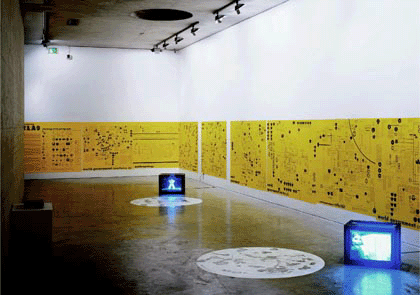 >> Bureau d’Ètudes, World Monitoring Atlas, 2003, Exhibition view
>> Bureau d’Ètudes, World Monitoring Atlas, 2003, Exhibition view
I had a chance to speak in Vienna about a month before the opening, within the prestigious new MuseumQuartier, which itself looks something like a banking complex for pictures. I’d already funneled Generali’s cash for the text to a Bureau d’Ètudes war-chest for future projects (the art-world equivalent of Geert Lovink’s ‘radical media pragmatism’). But the prospect of a talk raised a more important question: how to maintain the ‘other urgencies’ in a situation of public debate? We had to back up the explicitly anti-capitalist maps of Bureau d’Ètudes with some concrete work in Vienna that would overflow the frames of the art system.
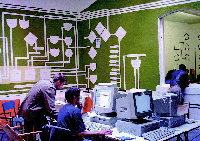 >> Bureau d’Ètudes, Syndicat Potentiel, Strassburg, 2000
>> Bureau d’Ètudes, Syndicat Potentiel, Strassburg, 2000
A critical position should go to the heart of the actual relation. People who theorise anti-capitalism are invited to a foundation emanating from a major European life-insurance company. What are they likely to do in practice, besides diverting the production money? What interests me are the ways that power relations get translated symbolically – that is, the struggle over cultural capital. In the last few years it has been intensifying, all over Europe. Now it seemed possible to go one step further, by laying the cards out on the table. So I wrote a description of the game, ‘Liar’s Poker’ (published in Springerin 1/03, [http://www.springerin.at/en]).
‘Liar’s Poker’ describes a fundamental hypocrisy that plagues the capitalist democracies. It’s a fact which is itself a provocation. Still there’s nothing more interesting than trying to produce the truth in public. And for that you have to create the opportunities. Vienna is the home of Public Netbase. It’s the kind of institution that has marked out a space of debate by constant and careful struggle with various levels of the state, essentially over questions of access and legitimacy. Not by chance have they worked for years on the use of networked tools for political experimentation. Nor by chance were they forced out of the MuseumsQuartier at the moment of its renovation. It seemed like a place for a deeper discussion of the mapping project, one that could involve a wider variety of actors. We decided to hold a parallel debate there, a day before the lecture program at the Generali. It turned into a parallel exhibition and distribution point for the Bureau d’Ètudes’ publications.
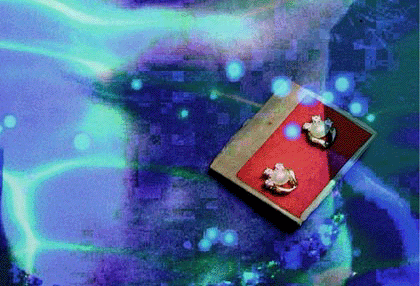 >> Raqs Media Collective, A/S/L, 2002
>> Raqs Media Collective, A/S/L, 2002
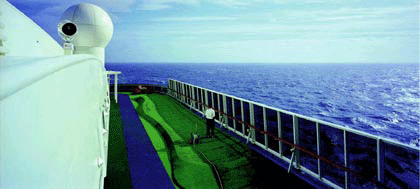 >> Multiplicity, Solid Sea Case 02: World-Odessa, 2002
>> Multiplicity, Solid Sea Case 02: World-Odessa, 2002
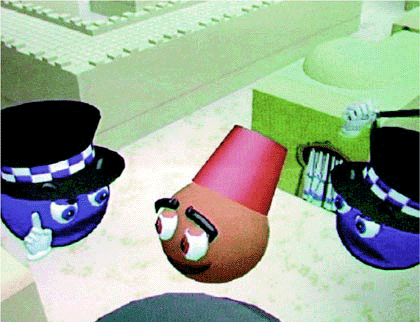 >> Frontera Sur RRVT, Valeriano LÛpez Domingues, Estrecho Adventure, Video Game Detail, 2003
>> Frontera Sur RRVT, Valeriano LÛpez Domingues, Estrecho Adventure, Video Game Detail, 2003
One of the things a critic can do is to look for confrontations, where the stakes in an argument become explicit. The two exhibitions in Vienna were a successful experiment in that direction. They showed that when you work with capable local people, you can organise a public thinking process, one that cuts through different levels of engagement. The discussion at Netbase went a long way, because it was obvious we were making an effort to find out what words mean. But for that to happen in a hypocritical society, some kind of conflict has to be visible. And I think it’s important to press your position at every level. There are so many good people caught up in art, for so many good reasons. It’s just too late in the day to hang around gnawing the bones of institutional critique.
To get started you have to name things, talk straight for a change. Proper names are the signatures of property, which on the level of finance has now become flagrant abuse. In the contemporary situation, cultural capital has become dirty money you can’t reinvest: it clings to your signature. Corporate power has to be challenged linguistically, by hundreds of thousands of ordinary intellectuals, in the street and in all the public spaces and media. If you can steal their megaphones, use ‘em for a day. But maybe it’s better to think about finding a few of your own for the long run. Just to insure a more autonomous future.
The Generali Foundation [http://www.gfound.or.at]The Generali Group [http://www.generali.com]‘Liar’s Poker’, Springerin [http://www.springerin.at]Public Netbase [http://www.t0.or.at/t0]
Brian Holmes <brian.holmes AT wanadoo.fr> is an art critic, activist and cultural theorist, and author of the forthcoming book of essays, Hieroglyphs of the Future: Art and Politics in a Networked Era
Mute Books Orders
For Mute Books distribution contact Anagram Books
contact@anagrambooks.com
For online purchases visit anagrambooks.com


